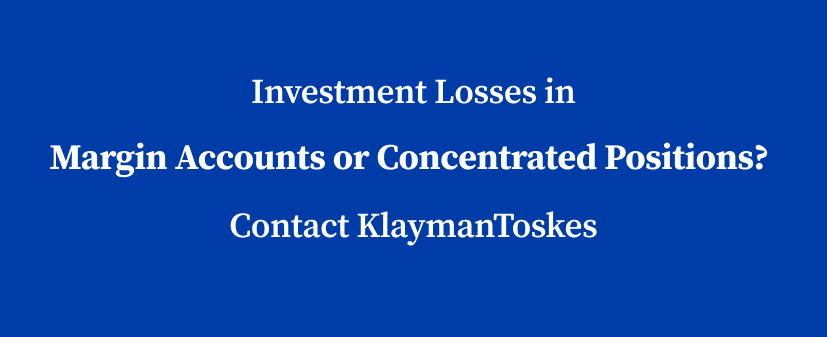
National investment fraud lawyers KlaymanToskes continues investigating damages sustained by investors who held large, concentrated positions, margin accounts, unsuitable asset allocations, or had an account that was excessively traded. The firm seeks to inform investors of the risks associated with investing on margin, and how they may recover investment losses.
Brokerage firms and their registered representatives have a duty to comply with FINRA sales practice rules and regulations, and can otherwise be subject to a legal cause of action through FINRA arbitration.
Investors that suffered losses at the hands of their brokerage/investment advisory firm are encouraged to contact attorney Lawrence L. Klayman, Esq. for a free consultation immediately at 888-997-9956 or lklayman@klaymantoskes.com to discuss your recovery options.
Margin trading can carry a number of risks for investors, as investing on margin is essentially a loan from a broker-dealer which uses the stock purchased as collateral. While trading “on margin” can increase an investor’s potential returns, it can also increase their risk and downside. In some circumstances, investors may risk losing more than they initially invested.
When trading on margin, a minimum deposit of the purchase price is usually required from the investor by FINRA. This deposit is generally known as a “margin minimum,” and may be higher depending on additional requirements from the investor’s broker-dealer. This is generally equivalent to the lesser of $2000 or 100% of the purchase price in your account. For day trading, you are required to deposit $25,000. The “initial margin,” or the amount an investor can borrow, cannot exceed 50% of the purchase price.
It is important to note that when brokerage/advisory firms and their brokers/advisors fail to recommend risk-management strategies to protect margined or concentrated positions, or unsuitably recommend the use of margin, they can be held liable in FINRA arbitration claims.
If you buy securities on margin, there will be restrictions on your account known as a “maintenance margin,” which requires you to keep a certain minimum amount of equity in your account, generally between 30% to 40%.
If your account falls below your maintenance margin, you will be issued a “margin call” by your broker-dealer and will need to place additional funds and/or assets into your account. If you are unable to meet the broker-dealer’s margin call requirements, your brokerage firm may sell your investments in an attempt to increase your account’s equity.
Brokerage/investment advisory firms are not required to notify investors of margin calls, meaning your assets can be sold without your consent. Broker-dealer firms can also increase your maintenance margin requirements at any time, without your knowledge. Even if you are notified, the firm maintains its right to sell your assets, including selling at a loss.
KlaymanToskes can help you determine if your investment loss is due to the misconduct and/or securities violations of a brokerage/investment advisory firm, or one of its registered brokers/financial advisors. We do not collect attorneys’ fees unless we obtain a financial recovery for you.
Contact attorney Lawrence L. Klayman, Esq. for a free consultation immediately at 888-997-9956 or lklayman@klaymantoskes.com to discuss your recovery options.
KlaymanToskes is a leading national securities law firm which practices exclusively in the field of securities arbitration on behalf of retail and institutional investors throughout the world in large and complex securities matters. The firm has recovered over $250 million in FINRA arbitrations and over $350 million in other securities litigation matters. KlaymanToskes has office locations in California, Florida, New York, and Puerto Rico.
KlaymanToskes, P.A.
Lawrence L. Klayman, Esq.
888-997-9956
lklayman@klaymantoskes.com
www.klaymantoskes.com